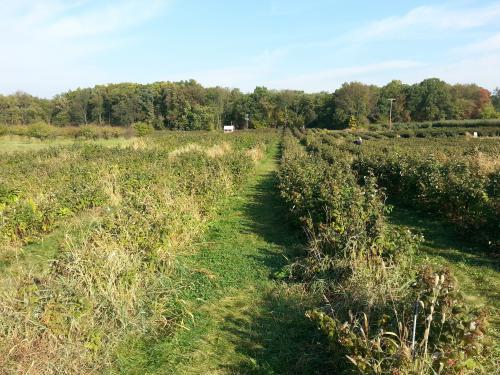Raspberry virus survey to help diagnose production problems
Growers who have seen symptoms such as crumbly fruit, low vigor or leaf yellowing are invited to participate in virus survey until Oct. 21, 2016.

Thanks to funding from the Michigan State Horticultural Society, we will again be able to provide assistance in diagnosing raspberry problems that may be caused by plant viruses. In 2015, we identified some virus infections that may be to blame for raspberry decline and “crumbly berry” symptoms in Michigan, such as infections with tomato ringspot virus and raspberry bushy dwarf virus. Symptoms include berries that are smaller than usual, misshapen and crumbly when harvested, particularly in older fields. They may be of such poor quality that they are not marketable. The canes and leaves appear normal in some cases while in other cases plants show yellowing and stunting and an overall decline.
It is difficult to determine the reason for crumbly fruit, as there are multiple possible causes. For instance, poor pollinating weather or an inadequate number of bees may result in a reduced number of drupelets. Tarnished plant bug can also cause crumbly fruit by feeding on the flowers or developing fruit. As a result, some drupelets do not develop and berries become irregularly shaped, small and crumbly. Regular scouting can help determine if tarnished plant bug is to blame, whereas weather data and observations on bee numbers may help sort out pollination issues. However, viral infections can only be confirmed by laboratory tests.

Raspberry field declining due to infection with tomato ringspot virus.
To assist raspberry growers in determining possible viral causes of production problems, a survey will be conducted in Michigan raspberry fields for viruses until Oct. 21, 2016. Growers who have seen symptoms in their fields in the past such as crumbly fruit, low vigor or leaf yellowing or mottling are invited to participate as well as anyone who is suspicious of viral problems in their fields. Leaf samples will be sent to Bob Martin at the USDA-ARS in Corvallis, Oregon, for testing for all viruses that commonly infect brambles. The tests will be free to growers who will receive a report when testing is completed (results will remain anonymous). Please contact your local Michigan State University University extension educator, or me at schilder@msu.edu or 517-355-0483, if you would like to participate in the survey or have any questions related to this survey.



 Print
Print Email
Email



